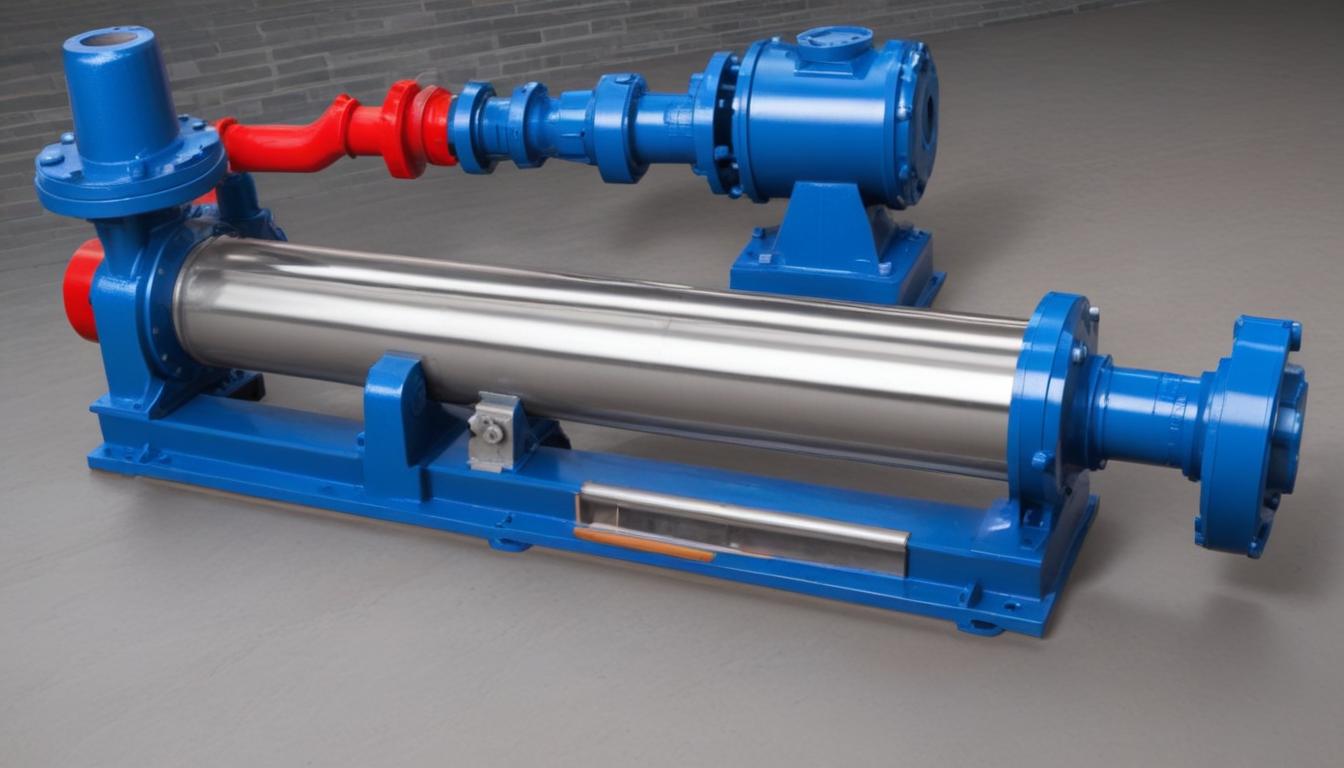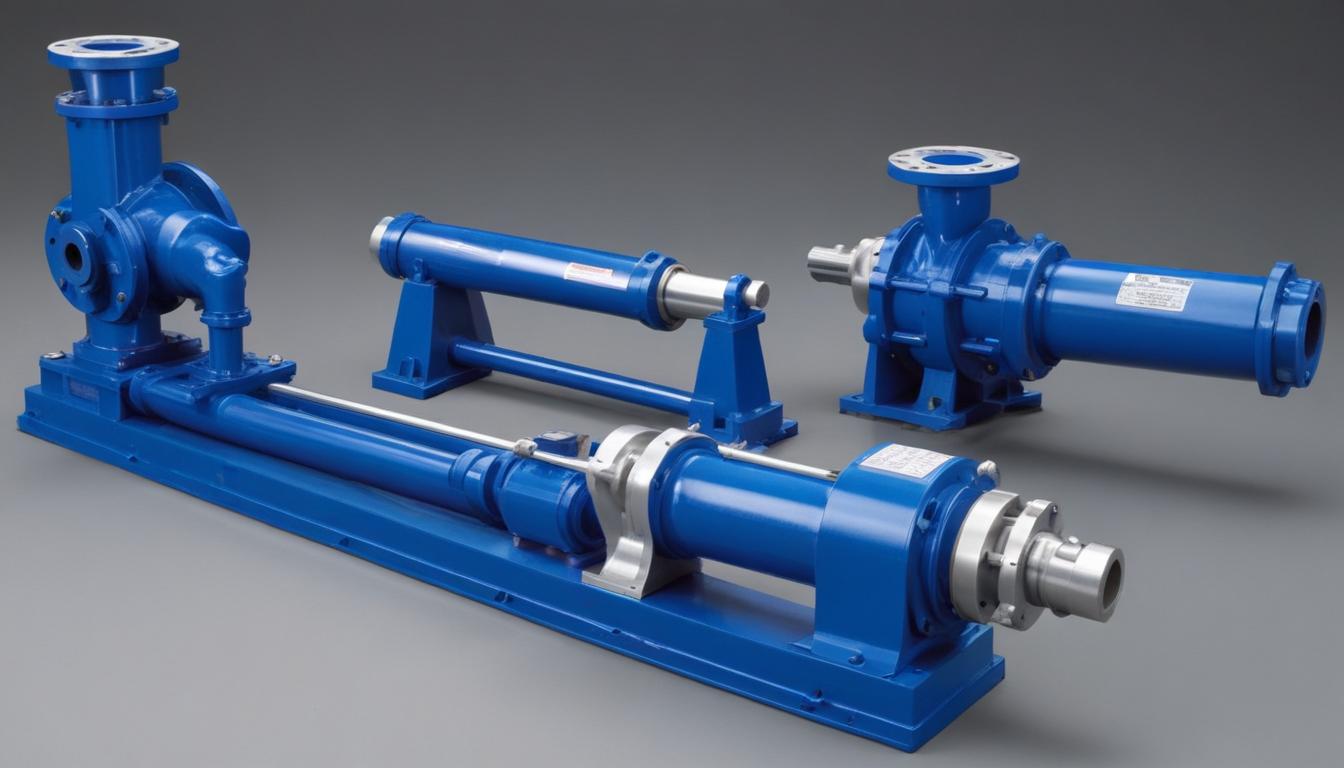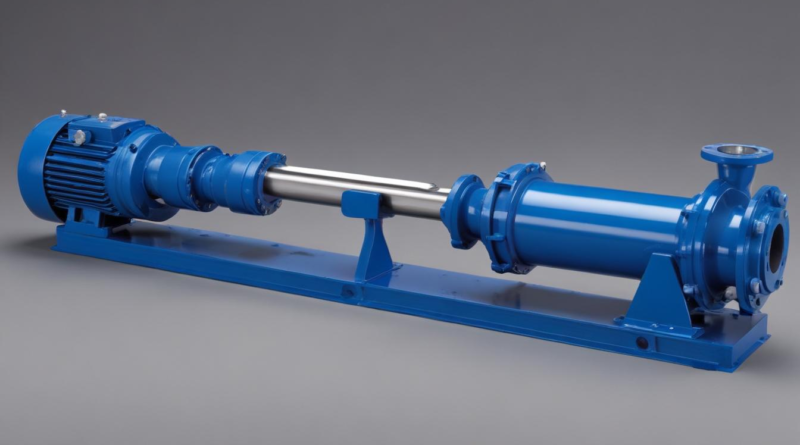Why progressive cavity pumps are ideal for viscous fluids
Progressive cavity pumps are a type of positive displacement pump designed to handle a variety of fluids, particularly viscous fluids. These pumps operate using a helical rotor that turns inside a stator, creating a series of cavities or chambers that transport the fluid from the inlet to the outlet in a continuous flow. This unique design allows progressive cavity pumps to efficiently move materials that traditional centrifugal pumps struggle with, such as thick sludges, pastes, or other non-Newtonian fluids. The suitability of progressive cavity pumps for viscous fluids is attributed to their ability to maintain a steady flow rate and discharge pressure, regardless of the fluid’s viscosity changes.
- Operation Principle: The helical rotor’s rotation generates a vacuum that draws fluid into the pump, which is then transported through the cavities created between the rotor and stator.
- Flow Rate: The flow rate in progressive cavity pumps can be easily adjusted by changing the rotor speed, making them versatile for different applications.
- Low Pulsation: These pumps provide a smooth and continuous flow with minimal pulsation, which is crucial for sensitive applications.
- Self-Priming: Progressive cavity pumps have excellent self-priming capabilities, allowing them to operate efficiently even with low fluid levels.
Due to their design, progressive cavity pumps can handle solid-laden slurries and have a low shear rate, making them ideal for applications where the integrity of the fluid’s properties must be maintained. This characteristic is particularly beneficial in food processing and chemical manufacturing industries, where the alteration of fluid properties can lead to inferior product quality. Additionally, the wear resistance of the materials used in the construction of these pumps allows for longevity and reduced maintenance needs when handling abrasive or corrosive substances.
Advantages of Progressive Cavity Pumps for Viscous Fluids
The advantages of using progressive cavity pumps for handling viscous fluids are numerous and significant. One primary benefit is their ability to maintain a constant flow rate regardless of the viscosity changes in the fluid being pumped. This suitability makes them ideal for applications where fluid characteristics may vary. Furthermore, these pumps exhibit minimal shear stress on the fluid, preserving the integrity of sensitive materials, which is crucial in industries such as food and pharmaceuticals.
Another advantage is their capability to effectively manage materials with high solids content. Progressive cavity pumps are designed to transport slurries without compromising solid particle integrity. This attribute allows them to function successfully in industries where abrasive or solid-laden fluids are common, such as wastewater treatment and mining.
In addition, progressive cavity pumps provide excellent operational versatility. They can be driven by various power sources, including electric motors, hydraulic pumps, or even gas engines, making them adaptable for different scenarios and infrastructure setups. Their low operational costs further enhance their appeal, as these pumps typically demonstrate energy efficiency due to their design that minimizes friction losses.
Ease of maintenance is another considerable factor. With simpler component designs and fewer moving parts compared to other pump types, progressive cavity pumps require less frequent servicing. Regular routines can lead to reduced downtime, thereby improving overall productivity in demanding production environments.
Moreover, these pumps are capable of handling challenging operational environments. Their robust construction allows for operation at varying temperatures and pressures, which is essential for industrial applications that can test the limits of traditional pumping equipment. This durability extends the operational lifespan of the pump, particularly when used in harsh conditions.
For engineers and pump users, understanding the advantages of progressive cavity pumps when dealing with viscous fluids can lead to more informed equipment selection and application strategies. The unique features offered by this type of pump ensure that they remain a preferred choice in various industrial processes, fundamentally enhancing the efficiency and effectiveness of fluid transfer operations.
Applications in Various Industries

Progressive cavity pumps find extensive applications across a multitude of industries due to their unique design features and ability to handle a wide range of viscous fluids. These pumps are especially suited for scenarios where fluid characteristics pose challenges for conventional pumping solutions. Below are several key industries where progressive cavity pumps have proven to be invaluable:
- Food and Beverage Industry:
In the food processing sector, progressive cavity pumps are utilized for transferring thick materials such as sauces, purees, and pastes. Their low shear rate ensures that the texture and consistency of these products remain intact, which is crucial for maintaining quality standards. Moreover, these pumps are equipped to handle sanitary protocols, meeting compliance requirements for food safety.
- Chemical Manufacturing:
Progressive cavity pumps are commonly used in the chemical industry for transferring viscous fluids like slurries, paints, and adhesives. The ability to manage high-solids content without damaging the particles makes these pumps ideal for applications requiring precision and reliability. Their durability in handling corrosive substances further enhances their suitability in this sector.
- Oil and Gas:
In the oil and gas industry, progressive cavity pumps are employed for the efficient transfer of crude oil and viscous drilling muds. Their capacity to maintain a consistent flow rate, even with varying viscosity, allows for efficient operation in extraction and transport processes. Additionally, their self-priming capabilities ensure reliable performance in challenging environmental conditions.
- Wastewater Treatment:
Progressive cavity pumps play a crucial role in wastewater treatment facilities by handling thick sludge and slurry with high solid content. Their robust construction and ability to function effectively in challenging conditions contribute to efficient solids removal and processing. This reliability is pivotal in managing the environmental impact and ensuring compliance with local regulations.
- Pulp and Paper:
In the pulp and paper sector, these pumps facilitate the transfer of pulps, slurries, and thick coatings. Their ability to operate at various temperature and pressure conditions makes them ideal for the fluctuating demands of the paper manufacturing process. Additionally, the gentle handling of materials helps ensure that the quality of the final product is not compromised.
Overall, the versatility of progressive cavity pumps allows them to be effectively utilized in situations where traditional pumps struggle, solidifying their role as essential equipment across diverse industrial applications. Their suitability for handling viscous fluids, combined with an ability to manage solid-laden slurries, highlights their importance in maintaining operational efficiency and product quality across several sectors.
Comparing Progressive Cavity Pumps to Other Pump Types
When comparing progressive cavity pumps to other pump types, such as centrifugal, diaphragm, and gear pumps, several key differences emerge that highlight the benefits and suitability of progressive cavity pumps for viscous fluids.
Centrifugal Pumps: Centrifugal pumps are widely used for low-viscosity fluids due to their ability to generate high flow rates. However, when it comes to handling viscous fluids, they tend to perform poorly. The flow rate of centrifugal pumps decreases significantly as viscosity increases, often leading to cavitation and reduced efficiency. In contrast, progressive cavity pumps maintain a consistent flow rate and pressure for viscous fluids, making them a superior choice when dealing with challenging materials.
Diaphragm Pumps: While diaphragm pumps can handle various fluids, including corrosive and viscous liquids, they often require frequent maintenance due to wear on the diaphragm and internal components. This can lead to downtime and increased operational costs. On the other hand, progressive cavity pumps have fewer wearing parts and a more robust design. Their reliable operation with high-solids content provides excellent longevity, reducing the need for regular maintenance and allowing for continuous, uninterrupted operation.
Gear Pumps: Gear pumps are another alternative for transferring viscous fluids; however, they can introduce significant shear forces that cause damage or alteration to sensitive materials. Progressive cavity pumps excel in this regard as they produce a low shear environment, maintaining the integrity of the fluid being pumped. This quality is particularly critical in industries such as food processing or pharmaceuticals, where material properties are essential for product quality.
| Pump Type | Flow Characteristics | Maintenance | Suitable for Viscous Fluids |
|---|---|---|---|
| Centrifugal Pumps | Decreased flow with increasing viscosity | Higher frequency of maintenance | Not ideal |
| Diaphragm Pumps | Variable, can handle some viscosity | Regular maintenance needed | Moderate |
| Gear Pumps | Good for low to moderate viscosity | Moderate maintenance required | Not suitable for sensitive fluids |
| Progressive Cavity Pumps | Consistent flow regardless of viscosity | Low maintenance needs | Highly suitable |
In conclusion, while other pump types may serve specific purposes effectively, progressive cavity pumps stand out for their unparalleled ability to deal with a variety of viscous fluids, high solids content, low shear characteristics, and the reduced maintenance requirements. These attributes make progressive cavity pumps a compelling choice for engineers and pump users seeking reliable and efficient pumping solutions across diverse industrial applications.
Maintenance and Best Practices for Optimal Performance

To ensure the reliable operation of progressive cavity pumps, regular maintenance routines and best practices are essential for optimal performance. The longevity and efficiency of these pumps largely depend on adherence to these guidelines, particularly when handling viscous fluids and materials with high solids content.
One of the most critical aspects of maintenance is routine inspection. Visual inspections should be performed to check for leaks, wear, or damage to key components such as the rotor and stator. Regularly monitoring the condition of these components can help identify issues before they escalate into significant problems, thereby avoiding costly repairs and downtime.
Additionally, conducting lubrication checks is vital for ensuring the smooth operation of the pump. Following the manufacturer’s guidelines for lubrication intervals and quantities can prevent friction and overheating, which may lead to premature wear of the pump components. Using the correct type of lubricant is paramount, especially when transferring viscous fluids that may require specific properties from the lubricants to facilitate efficient operation.
Another best practice involves monitoring flow rates and pressures during operation. Keeping track of these parameters helps operators detect deviations from typical performance, which may indicate a blockage, wear, or other issues. Utilizing pressure gauges and flow meters can provide real-time data that is invaluable for maintaining the pump’s operating conditions.
It is also highly recommended to implement a regular cleaning schedule for the pump and associated piping. Accumulations of particulate matter or build-up of the viscous fluids can lead to clogs or reduced efficiency. Periodic cleaning not only helps maintain the integrity of the pump but also ensures optimal flow and pressure handling.
Subsequently, understanding the suitability of the pump for the specific application is essential. Engineers and pump users should be familiar with the viscosity characteristics of the fluids being processed. This knowledge aids in selecting the correct pump size and operational speed, as well as preparing for any necessary adjustments based on changes in fluid characteristics.
Finally, training personnel who operate and maintain the pumps is crucial. Well-trained staff can identify potential issues early, adhere to safety protocols, and understand the intricacies of how progressive cavity pumps function. Regular training sessions can keep teams updated on best practices and innovations in pump technology, further enhancing efficiency and reducing the risk of operational mishaps.
By implementing these maintenance strategies and best practices, users can maximize the performance and lifespan of progressive cavity pumps, ensuring they remain reliable assets in the handling of viscous fluids across various industrial applications.



